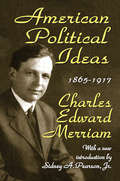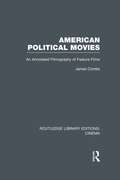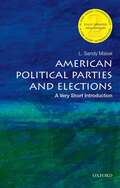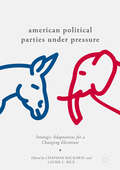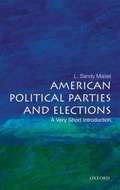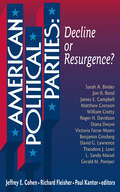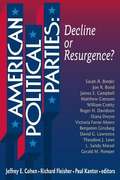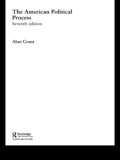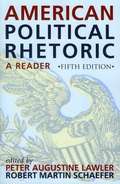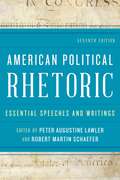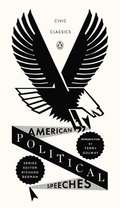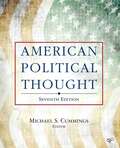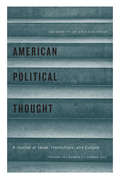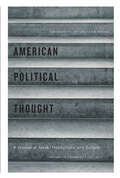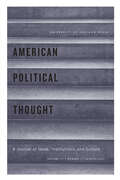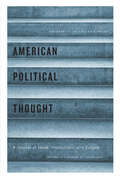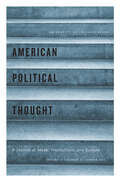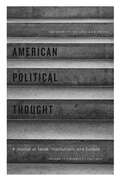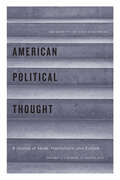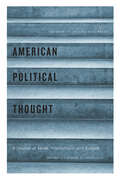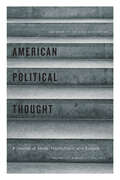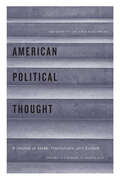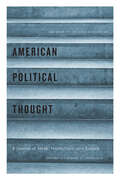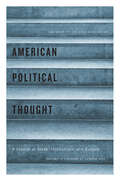- Table View
- List View
American Political Ideas, 1865-1917
by Charles MerriamCharles Merriam is scarcely read today, and even among scholars he is probably more often cited than read seriously. His ambiguous position in the study of American democracy is unfortunate. Between the two world wars, Merriman was the doyen of American political science. This was a period when the most formative characteristics of academic social sciences were taking shape, characteristics that were to dominate the remainder of the century. During this period, "science" and "progress" became virtually synonymous in the social sciences. Between the two world wars, the liberal progressive critique of America's founders, a critique that included scholars such as Woodrow Wilson, Charles Beard, and others, became the orthodoxy of a new political science. The heart of that critique, insofar as it turned on methodological questions of how to study American government, was very much the work of Charles Merriam. Anyone who seeks to understand why that period was so pivotal in the interpretation of American democracy must necessarily study Charles Merriam and his influence. His work represents the first comprehensive effort by a scholar in the liberal-progressive tradition to survey the entirety of American political thought. To read Merriam's political essays and writings is to read a political theory that the behavioral tradition would come to label as "normative." His essays included insightful interpretations of Hobbes and Rousseau in European political philosophy as well as an earlier work tracing American political thought from the founding to the Civil War. This is a fundamental work for scholars working in the liberal-progressive tradition.
American Political Movies: An Annotated Filmography of Feature Films (Routledge Library Editions: Cinema)
by James CombsEssays here explore the relationship between politics and explicitly political feature films from the beginning of the movie industry to World War I, and for each decade through to the 1980's. The included filmography is particularly useful. Originally published in 1990, the method of inquiry put forward in this text is nonetheless extendable to the decades following its publication.
American Political Parties And Elections: A Very Short Introduction (Very Short Introductions Ser.)
by L. Sandy MaiselFew Americans and even fewer citizens of other nations understand the electoral process in the United States. Still fewer understand the role played by political parties in the electoral process or the ironies within the system. Participation in elections in the United States is much lower than in the vast majority of mature democracies. Perhaps this is because of the lack of competition in a country where only two parties have a true chance of winning, despite the fact that a large number of citizens claim allegiance to neither and think badly of both. Or perhaps it is because in the U.S. campaign contributions disproportionately favor incumbents in most legislative elections, or that largely unregulated groups such as the now notorious 527s have as much impact on the outcome of a campaign as do the parties or the candidates' campaign organizations. These factors offer a very clear picture of the problems that underlay our much trumpeted electoral system. The second edition of this Very Short Introduction introduces the reader to these issues and more. Drawing on updated data and new examples from the 2016 presidential nominations, L. Sandy Maisel provides an insider's view of how the system actually works while shining a light on some of its flaws. He also illustrates the growing impact of campaigning through social media, the changes in campaign financing wrought by the Supreme Court recent decisions, and the Tea Party's influence on the sub-presidential nominating process. As the United States enter what is sure to be yet another highly contested election year, it is more important than ever that Americans take the time to learn the system that puts so many in power.
American Political Parties Under Pressure: Strategic Adaptations for a Changing Electorate
by Chapman Rackaway Laurie L. RiceThis book addresses the changing electoral and political circumstances in which American political parties found themselves during the 2016 election, and the strategic adaptations this new pressure may require. The respective establishments of both major political parties have found themselves facing serious challenges. Some observers wondered if realignment was in progress, and whether the parties could survive. Both grounded in research and accessible to more than just academics, this book provides important insights into how political parties can move forward from 2016.
American Political Parties and Elections: A Very Short Introduction
by Louis Sandy MaiselFew Americans and even fewer citizens of other nations understand the electoral process in the United States. Still fewer understand the role played by political parties in the electoral process or the ironies within the system. Participation in elections in the United States is much lower than in the vast majority of mature democracies. Perhaps this is because of the lack of competition in a country where only two parties have a true chance of winning, despite the fact that a large number of citizens claim allegiance to neither and think badly of both. Or perhaps it is because in the U.S. campaign contributions disproportionately favor incumbents in most legislative elections, or that largely unregulated groups such as the now notorious 527s have as much impact on the outcome of a campaign as do the parties or the candidates' campaign organizations. Studying these factors, you begin to get a very clear picture indeed of the problems that underlay our much trumpeted electoral system. This Very Short Introduction introduces the reader to these issues and more, providing an insider's view of how the system actually works while shining a light on some of its flaws. As we enter what is sure to be yet another highly contested election year, it is more important than ever that Americans take the time to learn the system that puts so many in power.
American Political Parties: Decline or Resurgence?
by Richard Fleisher Paul Kantor Jeffrey E CohenPowerful cross-currents of both decline and resurgence have been affecting American political parties over the past several decades. Is the era of decline that began in the late 1960s over and are the parties in a new era of rebuilding? In what direction are the parties headed and what does it mean for a healthy and well-functioning democracy? American Political Parties brings together a distinguished team of contributors to explore these questions. Students are exposed to original, "state-of-the-art" research on the parties that is written to be accessible and engaging.Presenting both historical and contemporary material on the changing U.S. parties, the book offers a balanced portrait and a wide variety of views concerning the continuing weaknesses of the parties and their concurrent signs of revitalization. Essays examine three important elements of parties—the parties in the mass public, the parties as electoral and political organizations, and the parties as governing groups. Two themes recur throughout—the first deals with party change (specifically realignment and dealignment) and the second with party responsibility in a democratic government. The concluding chapter places the contibutors' various findings and viewpoints in perspective. It offers several theories to help explain why the parties seem to be following their dual paths of development and considers the implications of this state of affairs for the future of American democracy.
American Political Parties: Decline or Resurgence?
by Jeffrey E. Cohen Richard Fleisher Paul KantorPowerful cross-currents of both decline and resurgence have been affecting American political parties over the past several decades. Is the era of decline that began in the late 1960s over and are the parties in a new era of rebuilding? In what direction are the parties headed and what does it mean for a healthy and well-functioning democracy? American Political Parties brings together a distinguished team of contributors to explore these questions. Students are exposed to original, state-of-the-art research on the parties that is written to be accessible and engaging. Presenting both historical and contemporary material on the changing U. S. parties, the book offers a balanced portrait and a wide variety of views concerning the continuing weaknesses of the parties and their concurrent signs of revitalization. Essays examine three important elements of parties -- the parties in the mass public, the parties as electoral and political organizations, and the parties as governing groups. Two themes recur throughout -- the first deals with party change (specifically realignment and dealignment) and the second with party responsibility in a democratic government. The concluding chapter places the contibutors' various findings and viewpoints in perspective. It offers several theories to help explain why the parties seem to be following their dual paths of development and considers the implications of this state of affairs for the future of American democracy.
American Political Process
by Alan GrantAmerican Political Process examines both the formal institutions of government and organizations such as political parties and pressure groups. It analyzes how these bodies interact in the making of public policy in the United States in order to provide an understanding of contemporary American politics. The seventh edition has been thoroughly updated and revised with entirely new material on: the 2000 Presidential election and George W. Bush's presidency the September 11th attacks and the 'War on Terrorism' the 2002 mid-term elections controversial issues such as abortion and gun control. Each chapter includes a variety of useful tables and diagrams, suggestions for further reading and relevant websites and a glossary of key terms. Written with admirable clarity, this is the ideal textbook for students of American politics and society.
American Political Rhetoric: A Reader (5th edition)
by Peter Augustine Lawler Robert Martin SchaeferThis reader is designed for introductory classes in American politics and government that are focused on fundamental political principles. It includes classic examples of the nation's political rhetoric.
American Political Rhetoric: Essential Speeches And Writings
by Peter Augustine Lawler Robert Martin SchaeferAmerican Political Rhetoric is the only reader for introductory classes in American politics, government, and political communication designed to explore fundamental political principles through examples of political rhetoric ranging from the founding to today. Now in its seventh edition, its selections include the entire political spectrum and contributors range from our nation's founders to contemporary elected public officials, Supreme Court opinions, and representatives of historic movements for social change. The new edition is fully updated to include recent Supreme Court decisions, edited for use in the classroom, presidential speeches, and expanded chapters on presidential powers, race, and gender. The book is now more useful than ever for students and teachers thanks to a supplementary website available at americanpoliticalrhetoric. com.
American Political Speeches
by Richard Beeman Terry GolwayA selection of speeches by the most inspiring and persuasive orators in American history Penguin presents a series of six portable, accessible, and--above all--essential reads from American political history, selected by leading scholars. Series editor Richard Beeman, author of The Penguin Guide to the U.S. Constitution, draws together the great texts of American civic life to create a timely and informative mini-library of perennially vital issues. Whether readers are encountering these classic writings for the first time, or brushing up in anticipation of the 50th anniversary of the Civil Rights Act, these slim volumes will serve as a powerful and illuminating resource for scholars, students, and civic-minded citizens. American Political Speeches includes the best American rhetoric from inside and outside the White House. Some of the greatest words spoken in American history have come from men and women who lacked the biggest bully pulpit in the country, but who nevertheless were able to move the nation with words. Frederick Douglass explained the irony of Independence Day from the perspective of a slave. Martin Luther King, Jr. described his dream of an interracial America. William Jennings Bryan gave voice to social discontent with a single phrase, "a cross of gold." Barbara Jordan summoned the nation"s outrage during the impeachment hearings against Richard Nixon. And the best presidents, not by coincidence, have tended to be those with an appreciation for the use of language: Lincoln explaining a new birth of freedom at Gettysburg; John Kennedy voicing moral outrage at the Berlin Wall; Franklin D. Roosevelt chatting to a nation gathered in front of radios; Ronald Reagan addressing Congress freshly healed from an assassination attempt.
American Political Thought
by Michael S. CummingsPresident Obama′s hope of bringing a new kind of politics to Washington has fallen on hard times, with hardening party lines reflecting ideological polarization. Utilizing the organizing theme of partisan gridlock in the seventh edition′s introductory materials and author headnotes, editor Michael Cummings reminds readers that partisanship has long been a recurring problem for Americans, dating back to the deadly conflicts among the Iroquois nations, to the debates of the constitutional convention, and to the near destruction of the young republic during the Civil War. American Political Thought challenges students to examine their own political thinking in light of insights from past thinkers and in terms of the challenges they face as citizens of the twenty-first century. Along with time-tested readings, about one-third of this edition′s authors are new, including a number of thinkers from earlier periods, as well as more recent selections from liberal, conservative, and more unconventional thinkers.
American Political Thought, volume 10 number 3 (Summer 2021)
by American Political ThoughtThis is volume 10 issue 3 of American Political Thought. Bridging the gap between historical, empirical, and theoretical research, American Political Thought (APT) is the only journal dedicated exclusively to the study of the American political tradition. Interdisciplinary in scope, APT features research by political scientists, historians, literary scholars, economists, and philosophers who study the foundation and political tradition of concepts such as democracy, constitutionalism, equality, liberty, citizenship, political identity, and the role of the state.
American Political Thought, volume 10 number 4 (Fall 2021)
by American Political ThoughtThis is volume 10 issue 4 of American Political Thought. Bridging the gap between historical, empirical, and theoretical research, American Political Thought (APT) is the only journal dedicated exclusively to the study of the American political tradition. Interdisciplinary in scope, APT features research by political scientists, historians, literary scholars, economists, and philosophers who study the foundation and political tradition of concepts such as democracy, constitutionalism, equality, liberty, citizenship, political identity, and the role of the state.
American Political Thought, volume 11 number 1 (Winter 2022)
by American Political ThoughtThis is volume 11 issue 1 of American Political Thought. Bridging the gap between historical, empirical, and theoretical research, American Political Thought (APT) is the only journal dedicated exclusively to the study of the American political tradition. Interdisciplinary in scope, APT features research by political scientists, historians, literary scholars, economists, and philosophers who study the foundation and political tradition of concepts such as democracy, constitutionalism, equality, liberty, citizenship, political identity, and the role of the state.
American Political Thought, volume 11 number 2 (Spring 2022)
by American Political ThoughtThis is volume 11 issue 2 of American Political Thought. Bridging the gap between historical, empirical, and theoretical research, American Political Thought (APT) is the only journal dedicated exclusively to the study of the American political tradition. Interdisciplinary in scope, APT features research by political scientists, historians, literary scholars, economists, and philosophers who study the foundation and political tradition of concepts such as democracy, constitutionalism, equality, liberty, citizenship, political identity, and the role of the state.
American Political Thought, volume 11 number 3 (Summer 2022)
by American Political ThoughtThis is volume 11 issue 3 of American Political Thought. Bridging the gap between historical, empirical, and theoretical research, American Political Thought (APT) is the only journal dedicated exclusively to the study of the American political tradition. Interdisciplinary in scope, APT features research by political scientists, historians, literary scholars, economists, and philosophers who study the foundation and political tradition of concepts such as democracy, constitutionalism, equality, liberty, citizenship, political identity, and the role of the state.
American Political Thought, volume 11 number 4 (Fall 2022)
by American Political ThoughtThis is volume 11 issue 4 of American Political Thought. Bridging the gap between historical, empirical, and theoretical research, American Political Thought (APT) is the only journal dedicated exclusively to the study of the American political tradition. Interdisciplinary in scope, APT features research by political scientists, historians, literary scholars, economists, and philosophers who study the foundation and political tradition of concepts such as democracy, constitutionalism, equality, liberty, citizenship, political identity, and the role of the state.
American Political Thought, volume 12 number 1 (Winter 2023)
by American Political ThoughtThis is volume 12 issue 1 of American Political Thought. Bridging the gap between historical, empirical, and theoretical research, American Political Thought (APT) is the only journal dedicated exclusively to the study of the American political tradition. Interdisciplinary in scope, APT features research by political scientists, historians, literary scholars, economists, and philosophers who study the foundation and political tradition of concepts such as democracy, constitutionalism, equality, liberty, citizenship, political identity, and the role of the state.
American Political Thought, volume 12 number 2 (Spring 2023)
by American Political ThoughtThis is volume 12 issue 2 of American Political Thought. Bridging the gap between historical, empirical, and theoretical research, American Political Thought (APT) is the only journal dedicated exclusively to the study of the American political tradition. Interdisciplinary in scope, APT features research by political scientists, historians, literary scholars, economists, and philosophers who study the foundation and political tradition of concepts such as democracy, constitutionalism, equality, liberty, citizenship, political identity, and the role of the state.
American Political Thought, volume 12 number 3 (Summer 2023)
by American Political ThoughtThis is volume 12 issue 3 of American Political Thought. Bridging the gap between historical, empirical, and theoretical research, American Political Thought (APT) is the only journal dedicated exclusively to the study of the American political tradition. Interdisciplinary in scope, APT features research by political scientists, historians, literary scholars, economists, and philosophers who study the foundation and political tradition of concepts such as democracy, constitutionalism, equality, liberty, citizenship, political identity, and the role of the state.
American Political Thought, volume 12 number 4 (Fall 2023)
by American Political ThoughtThis is volume 12 issue 4 of American Political Thought. Bridging the gap between historical, empirical, and theoretical research, American Political Thought (APT) is the only journal dedicated exclusively to the study of the American political tradition. Interdisciplinary in scope, APT features research by political scientists, historians, literary scholars, economists, and philosophers who study the foundation and political tradition of concepts such as democracy, constitutionalism, equality, liberty, citizenship, political identity, and the role of the state.
American Political Thought, volume 13 number 1 (Winter 2024)
by American Political ThoughtThis is volume 13 issue 1 of American Political Thought. Bridging the gap between historical, empirical, and theoretical research, American Political Thought (APT) is the only journal dedicated exclusively to the study of the American political tradition. Interdisciplinary in scope, APT features research by political scientists, historians, literary scholars, economists, and philosophers who study the foundation and political tradition of concepts such as democracy, constitutionalism, equality, liberty, citizenship, political identity, and the role of the state.
American Political Thought, volume 13 number 2 (Spring 2024)
by American Political ThoughtThis is volume 13 issue 2 of American Political Thought. Bridging the gap between historical, empirical, and theoretical research, American Political Thought (APT) is the only journal dedicated exclusively to the study of the American political tradition. Interdisciplinary in scope, APT features research by political scientists, historians, literary scholars, economists, and philosophers who study the foundation and political tradition of concepts such as democracy, constitutionalism, equality, liberty, citizenship, political identity, and the role of the state.
American Political Thought, volume 13 number 3 (Summer 2024)
by American Political ThoughtThis is volume 13 issue 3 of American Political Thought. Bridging the gap between historical, empirical, and theoretical research, American Political Thought (APT) is the only journal dedicated exclusively to the study of the American political tradition. Interdisciplinary in scope, APT features research by political scientists, historians, literary scholars, economists, and philosophers who study the foundation and political tradition of concepts such as democracy, constitutionalism, equality, liberty, citizenship, political identity, and the role of the state.
